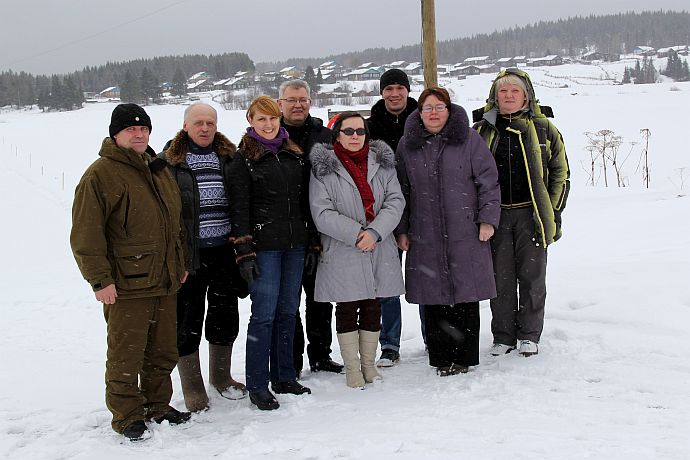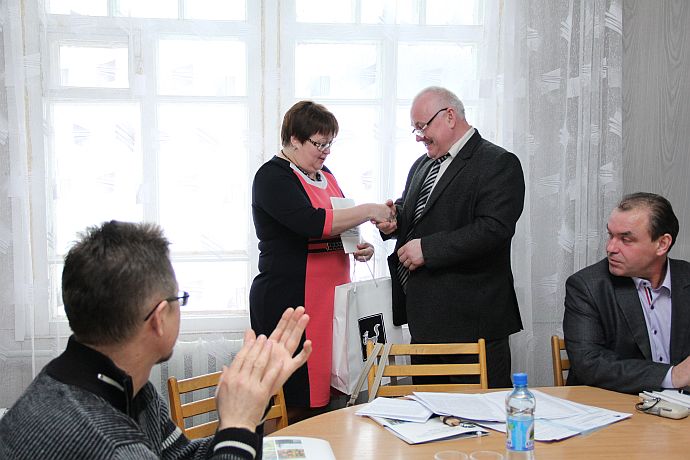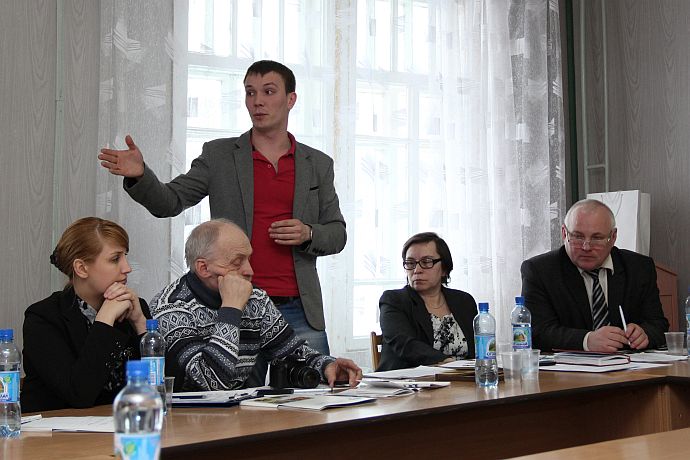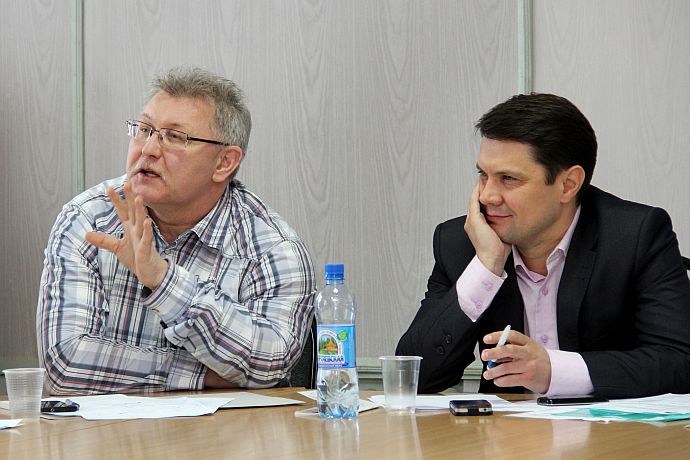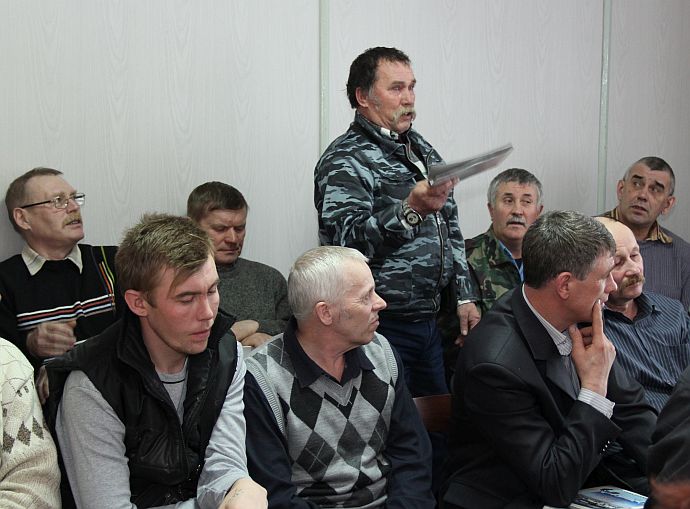Common Problems Have to Be Solved by Common Efforts
The first joint conference of the stakeholders representing different districts and regions, and different departments was held on March 14 within the frameworks of the “Model river Mezen” project. It was organized in the village Leshukonskoye – the center of the district with the same name adjacent to the Udorsky district and located in the middle reaches of the Mezen river where the Vashka meets the Mezen.
The initiative of the conference organization has been actively supported by the administration of the Leshukonsky district. Besides, the proposal has been met with interest by other parties – FSBI “Komirybvod” and “Sevrybvod”, Agency for fisheries of the Arkhangelsk region, Ministry of Agriculture and Food of the Republic of Komi, administrations of the rural settlements of the Leshukonsky district, Udorsky and Mezensky districts administrations.
The conference has also been attended by the heads of the Mezensky and Udorsky departments of state control, supervision and protection of water bioresources of the Dvina-Pechora territorial administration of the Federal Agency for Fishery of the Russian Federation, representatives of the NGOs – the community of indigenous people “Udorachi”, Silver Taiga Foundation, Community Council for fishery (Mezen district), the Barents Sea branch of the World Wildlife Fund (WWF Russia).
The conference started with a brief acquaintance with the municipal districts located near the Mezen. The representatives of the districts’ administrations provided the information about an economic situation there and the employment status, having reflected the specific features and the most pressing problems, as well as the role of the river and fish resources in the life of the local population.
It was followed by reports-presentations about the condition of the fish resources in the Mezen (E. Ryabova, FSBI “Komirybvod”), the current state and prospects for further development of the fishing on the Mezen (A. Korotenkov, Agency for fisheries of the Arkhangelsk region), the objectives of the “Model river Mezen” project and results of the first stage of its implementation (V. Semyashkina, Silver Taiga Foundation), the project initiative on the establishment of an Interregional target program on conservation and reproduction of the Atlantic salmon in the Mezen river (N. Shuktomov, Silver Taiga Foundation).
A report of Alexey Golenkevich, the coordinator of the sustainable fishing program of the Barents Sea branch of the WWF Russia has also been presented to the participants of the conference. Having started with the problem related to the conservation of the wild populations of the Atlantic salmon relevant for different regions of the world and analyses of the possible ways to solve it, Alexey dwelled in detail on the situation around the Varzuga salmon population and presented a draft program on its restoration designed for one life cycle of the Atlantic salmon.
It is to be recalled that the river Varzuga flows on the territory of the Kola Peninsula (Murmansk region) and as well as the Mezen flows into the White Sea. According to the ecologists of the Barents Sea branch of WWF, the key reason of the salmon depletion in numbers in the basin of the Varzuga is illegal fishing. Therefore, the suggested program is aimed at the improvement of the efficiency of the fish protection work. The initiators of the Varzuga salmon population rescue, as well as the ichthyologists who had worked in the Mezen project, reached a conclusion that creation of the favorable conditions for the wild salmon population spawning is more efficient and cost effective than an artificial reproduction. In their opinion, the only thing required for the population restoration is conservation of the spawning grounds and provision of the spawning population with a possibility to migrate and lay eggs without hindrance. The initiators of the WWF project think that this very objective, which is absolutely simple in substance but difficult to implement for a number of reasons, has to be fulfilled. Unfortunately, the accomplishment of this objective on the Mezen will require much more efforts and will hardly be possible without collaboration, and coordinated actions from all sorts of parties. If for no other reason than because of the fact that the length of the Mezen is four times bigger than the Varzuga and there are dozens of populated areas there, whereas only two villages are located near the Varzuga. However, a good thing is that there is a common vision of the situation and the ways for its improvement.
The chairman of the conference Yury Shubin, the Head of the Department of aquaculture and fishery of the Ministry of Agriculture and Food of the Komi Republic and the member of the Working group on the development of an interregional program on salmon conservation gave a chance to the audience to ask questions after every report and to the speaker – to answer them. This dialogue quite often grew into a discussion which is, primarily, an indication of the fact that the problems under discussion affect everybody and are interesting for everyone, and for many people they are simply vital.
The problem of overfishing mentioned in the reports and speeches has caused a hot discussion. The ichthyologists are inclined to believe that this is the main reason of the fish resources degradation. Some of the participants, in their turn, think that the fundamental reason of the river depletion is the shallowing and sand carry-over and believe that it’s the result of the large-scale logging in the Mezen basin.
There were other opinions as well. For example, according to some participants, the amateur fishing organized on the fishing grounds turns into a commercial one due to the lack of control and, probably, causes more damage than the fishing of local population. The Head of the Agency for fisheries of the Arkhangelsk region (these are the districts of the Arkhangelsk region where the amateur salmon fishing on the fishing grounds is organized) A. Korotenkov replied that all of us and, in the first instance, the fishery inspection has to reorient the forces: “We have to decide: either we will penalize elderly women and men for a trifle or we will organize high-powered consolidated raids to the places where the pouching is really flourishing”.
By the way, when inviting the management of the Dvina-Pechora territorial administration (DVPTA) of the Federal Agency for Fishery of the Russian Federation, the conference organizers hoped to hear their vision of the perspectives for perfection of the fish reserves protection. Unfortunately, looks like the leaders of DVPTA did not consider the event in the Leshukonskoye important enough to participate in it personally. None of the DVPTA subdivisions representatives spoke at the conference either. So, the participants didn’t get a chance to find out whether the fishery inspection associates its further work with the focus on the conservation of the fish reserves as a final result instead of the number of acts and penalties. According to the conference participants, that particular shall be the target of the fishery inspection.
And it has to be the target not only for the fishery inspection. The villagers, many of whom have fallen into income poverty due to unemployment, also make their “contribution” to the valuable resource destruction. How to change the attitude? A common opinion of the audience was expressed by the Head of the rural settlement “Kozmogorodskoye” from the Mezen district and the chairman of the district Community Council on fishery Viktor Obroskov: “All the existing rules are based on the prohibitive scheme. I think that it’s required to switch from the prohibitions to the controlled fishing with restrictions. In the 70-s the village councils had the right to issue a permit for fishing – I don’t mean salmon: salmon has to be protected but it’s needed to allow catching other types of fish”.
From all appearances, this option is far from the worst in the general scheme aimed at the salmon conservation: the conference participants agreed that if there will be more chances for catching other fish the pressure on the salmon will ease. In this regard, it makes sense, for example, to consider the possibilities of stocking with other fish species. According to the participants, permitting of a licensable salmon catching for the local residents could have a positive effect as well.
In general, the conference participants have expressed support of the “Model river Mezen” project initiatives. The villagers are ready for the personal participation in the project activities as well. For example, many people have actively responded to the initiative on the questioning of the population and even suggested optimum alternatives for its organization. In 2014 population questioning on two positions is planned. First, for identification of the illegal fishing volumes and, accordingly, total resource volumes: at present, nobody has got such a data, though it’s clear to everybody that the sustainable resource management is impossible without evaluation of its volume. Secondly, questioning of the residents, primarily, old-timers in order to determine the impact of the logging on the river condition will be conducted within the frameworks of the project.
All the conference participants have spoken in support of the awareness-raising, informational work with the population. For example, Ivan Yuryevich Klishov from the village Tsenogora, with whom we talked after the conference, believes, “Proper awareness-raising work is required. That’s what is most urgently needed and it shall be done in the first place. I think that the conference conducted in Leshukonskoye is a good step in the needed direction.”
The conference adopted the Resolution containing an address to the population of the Mezensky, Leshukonsky, and Udorsky districts and all stakeholders with a proposal to facilitate the development of a conscious attitude to the use of the Mezen fish resources – for the purpose of their conservation and further sustainable management.
Valentina Semyashkina
The photo is made by Sergey Davydov
Translated by Irina Sokolova

